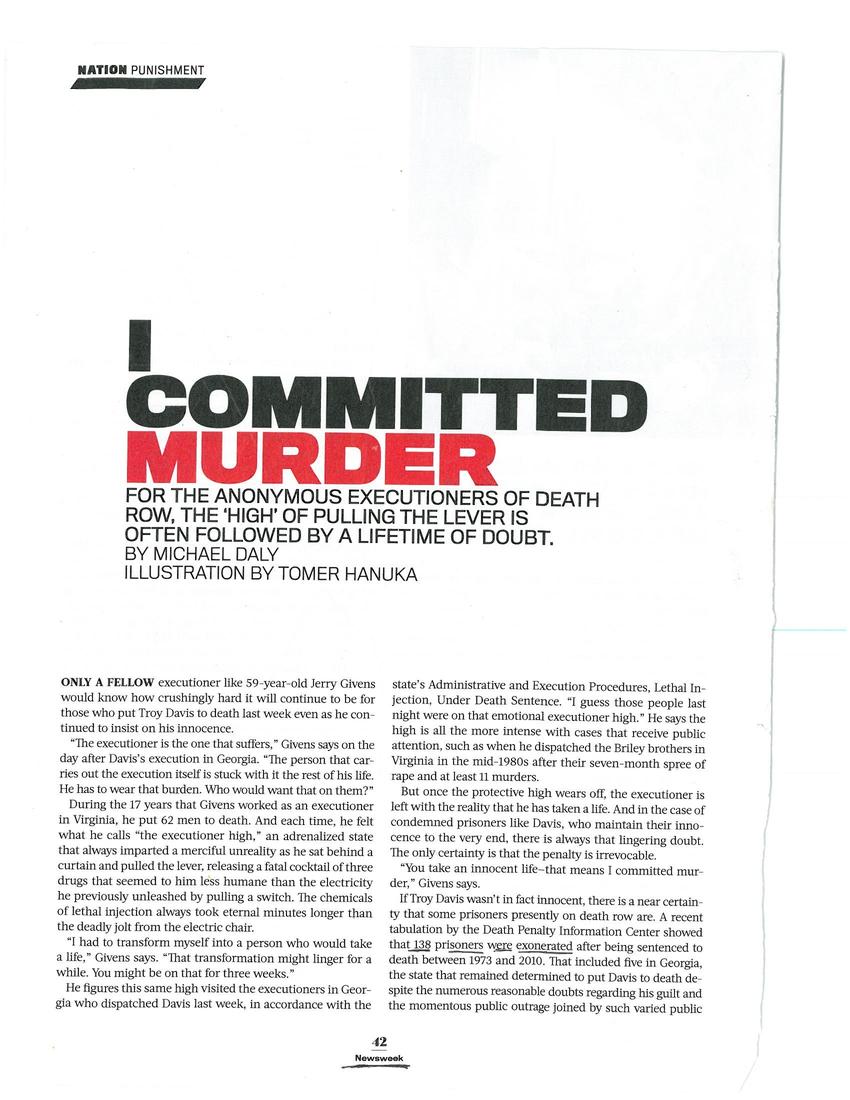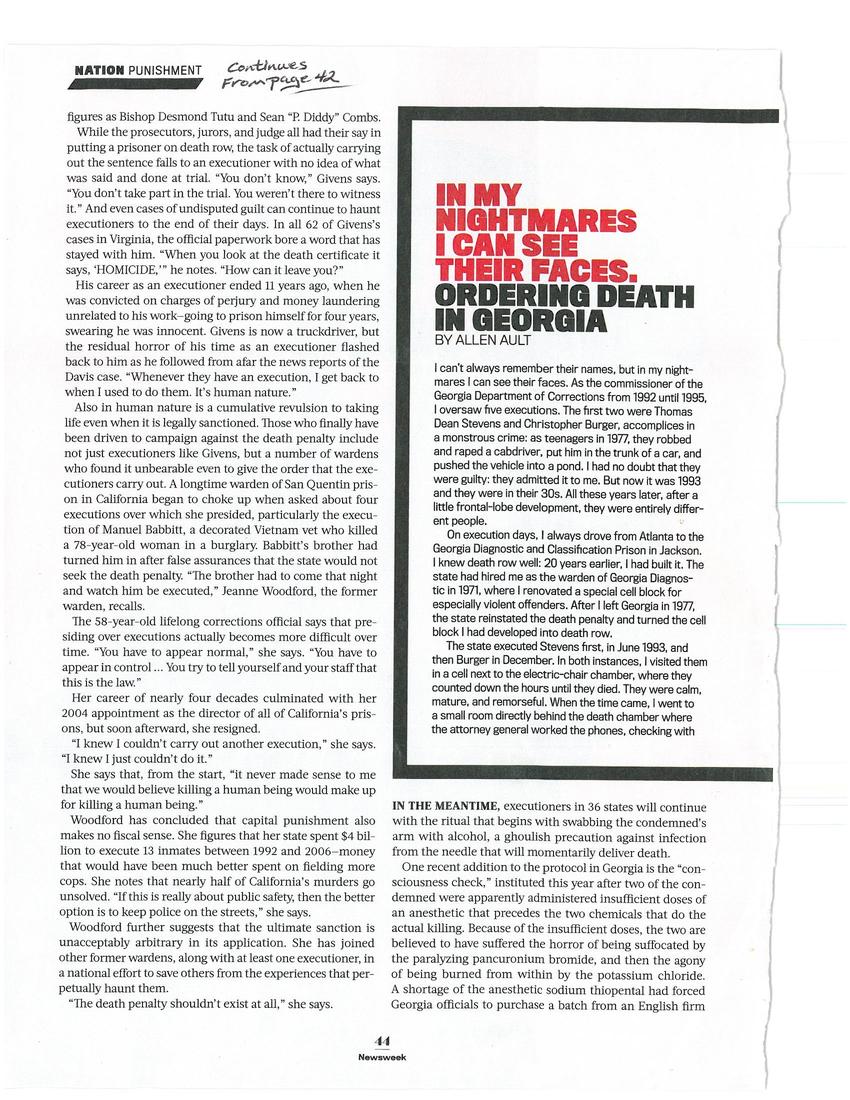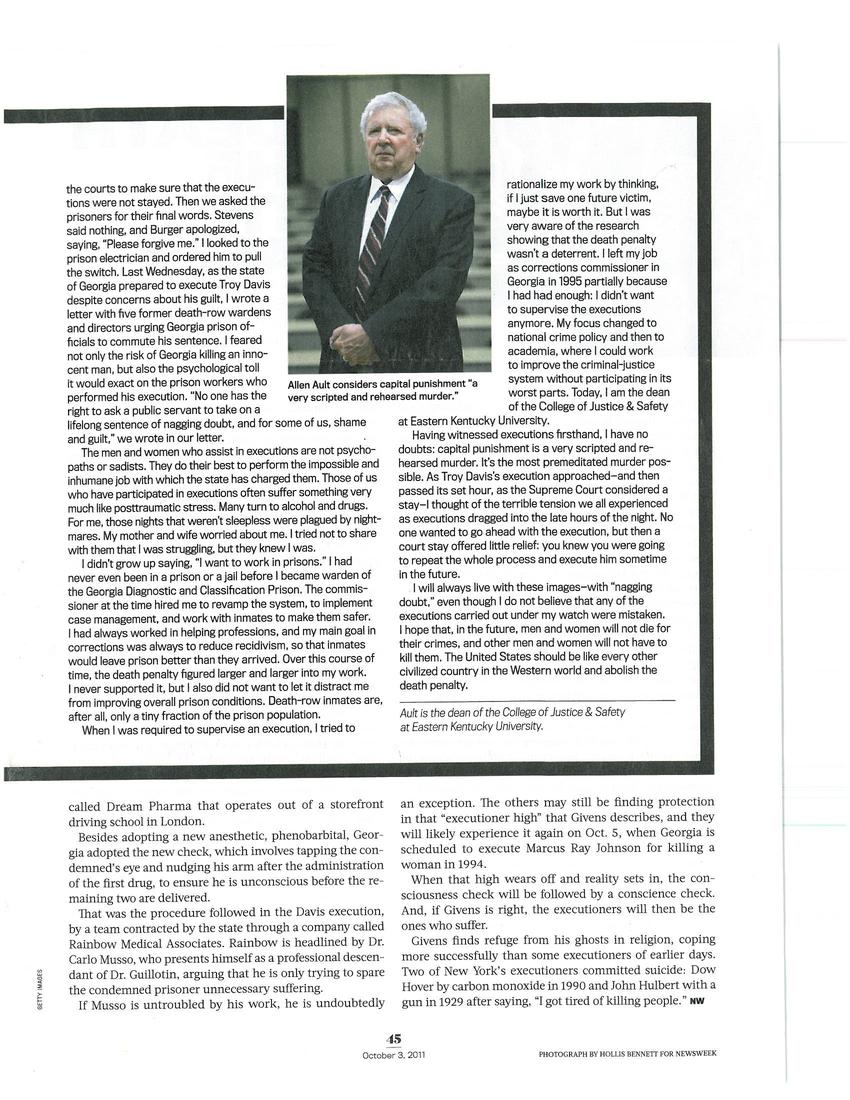
Transcription
I COMMITTED MURDER
For the anonymous executioners of death
row, the 'high' of pulling the lever is
often followed by a lifetime of doubt.
By Michael Daly
Illustration by Tomer Hunka
ONLY A FELLOW executioner like 59-year-old Jerry Givens would know how crushingly hard it will continue to be for those who put Troy Davis to death last week even as he continued to insist on his innocence.
“The executioner is the one that suffers,” Givens says on the day after Davis’s execution in Georgia. “The person that carries out the execution itself is stuck with it the rest of his life. He has to wear that burden. Who would want that on them?”
During the 17 years that Givens worked as an executioner in Virginia, he put 62 men to death. And each time, he felt what he calls “the executioner high,” an adrenalized state that always imparted a merciful unreality as he sat behind a curtain and pulled the lever, releasing a fatal cocktail of three drugs that seemed to him less humane than the electricity he previously unleashed by pulling a switch. The chemicals of lethal injection always took eternal minutes longer than the deadly jolt from the electric chair.
“I had to transform myself into a person who would take a life,” Givens says. “That transformation might linger for a while. You might be on that for three weeks.”
He figures this same high visited the executioners in Georgia who dispatched Davis last week, in accordance with the state’s Administrative and Execution Procedures, Lethal Injection, Under Death Sentence. “I guess those people last night were on that emotional executioner high.” He says the high is all the more intense with cases that receive public attention, such as when he dispatched the Briley brothers in Virginia in the mid-1980s after their seven-month spree of rape and at least 11 murders.
But once the protective high wears off, the executioner is left with the reality that he has taken a life. And in the case of condemned prisoners like Davis, who maintain their innocence to the very end, there is always that lingering doubt. The only certainty is that the penalty is irrevocable.
“You take an innocent life—that means I committed murder,” Givens says.
If Troy Davis wasn’t in fact innocent, there is a near certainty that some prisoners presently on death row are. A recent tabulation by the Death Penalty Information Center showed that 138 prisoners were exonerated after being sentenced to death between 1973 and 2010. That included five in Georgia, the state that remained determined to put Davis to death despite the numerous reasonable doubts regarding his guilt and the momentous public outrage joined by such varied public figures as Bishop Desmond Tutu and Sean “P. Diddy” Combs.
While the prosecutors, jurors, and judge all had their say in putting a prisoner on death row, the task of actually carrying out the sentence falls to an executioner with no idea of what was said and done at trial. “You don’t know,” Givens says. “You don’t take part in the trial. You weren’t there to witness it.” And even cases of undisputed guilt can continue to haunt executioners to the end of their days. In all 62 of Givens’s cases in Virginia, the official paperwork bore a word that has stayed with him. “When you look at the death certificate it says, ‘HOMICIDE,’” he notes. “How can it leave you?”
His career as an executioner ended 11 years ago, when he was convicted on charges of perjury and money laundering unrelated to his work—going to prison himself for four years, swearing he was innocent. Givens is now a truckdriver, but the residual horror of his time as an executioner flashed back to him as he followed from afar the news reports of the Davis case. “Whenever they have an execution, I get back to when I used to do them. It’s human nature.”
Also in human nature is a cumulative revulsion to taking life even when it is legally sanctioned. Those who finally have been driven to campaign against the death penalty include not just executioners like Givens, but a number of wardens who found it unbearable even to give the order that the executioners carry out. A longtime warden of San Quentin prison in California began to choke up when asked about four executions over which she presided, particularly the execution of Manuel Babbitt, a decorated Vietnam vet who killed a 78-year-old woman in a burglary. Babbitt’s brother had turned him in after false assurances that the state would not seek the death penalty. “The brother had to come that night and watch him be executed,” Jeanne Woodford, the former warden, recalls.
The 58-year-old lifelong corrections official says that presiding over executions actually becomes more difficult over time. “You have to appear normal,” she says. “You have to appear in control ... You try to tell yourself and your staff that this is the law.”
Her career of nearly four decades culminated with her 2004 appointment as the director of all of California’s prisons, but soon afterward, she resigned.
“I knew I couldn’t carry out another execution,” she says. “I knew I just couldn’t do it.”
She says that, from the start, “it never made sense to me that we would believe killing a human being would make up for killing a human being.”
Woodford has concluded that capital punishment also makes no fiscal sense. She figures that her state spent $4 billion to execute 13 inmates between 1992 and 2006—money that would have been much better spent on fielding more cops. She notes that nearly half of California’s murders go unsolved. “If this is really about public safety, then the better option is to keep police on the streets,” she says.
Woodford further suggests that the ultimate sanction is unacceptably arbitrary in its application. She has joined other former wardens, along with at least one executioner, in a national effort to save others from the experiences that perpetually haunt them.
“The death penalty shouldn’t exist at all,” she says.
IN THE MEANTIME, executioners in 36 states will continue with the ritual that begins with swabbing the condemned’s arm with alcohol, a ghoulish precaution against infection from the needle that will momentarily deliver death.
One recent addition to the protocol in Georgia is the “consciousness check,” instituted this year after two of the condemned were apparently administered insufficient doses of an anesthetic that precedes the two chemicals that do the actual killing. Because of the insufficient doses, the two are believed to have suffered the horror of being suffocated by the paralyzing pancuronium bromide, and then the agony of being burned from within by the potassium chloride. A shortage of the anesthetic sodium thiopental had forced Georgia officials to purchase a batch from an English firm called Dream Pharma that operates out of a storefront driving school in London.
Besides adopting a new anesthetic, phenobarbital, Georgia adopted the new check, which involves tapping the condemned’s eye and nudging his arm after the administration of the first drug, to ensure he is unconscious before the remaining two are delivered.
That was the procedure followed in the Davis execution, by a team contracted by the state through a company called Rainbow Medical Associates. Rainbow is headlined by Dr. Carlo Musso, who presents himself as a professional descendant of Dr. Guillotin, arguing that he is only trying to spare the condemned prisoner unnecessary suffering.
If Musso is untroubled by his work, he is undoubtedly an exception. The others may still be finding protection in that “executioner high” that Givens describes, and they will likely experience it again on Oct. 5, when Georgia is scheduled to execute Marcus Ray Johnson for killing a woman in 1994.
When that high wears off and reality sets in, the consciousness check will be followed by a conscience check. And, if Givens is right, the executioners will then be the ones who suffer.
Givens finds refuge from his ghosts in religion, coping more successfully than some executioners of earlier days. Two of New York’s executioners committed suicide: Dow Hover by carbon monoxide in 1990 and John Hulbert with a gun in 1929 after saying, “I got tired of killing people.”
[second inserted with the first article]
IN MY NIGHTMARES
I CAN SEE
THEIR FACES.
ORDERING DEATH IN GEORGIA PRISONS
By Allen Ault
I can’t always remember their names, but in my nightmares I can see their faces. As the commissioner of the Georgia Department of Corrections from 1992 until 1995, I oversaw five executions. The first two were Thomas Dean Stevens and Christopher Burger, accomplices in a monstrous crime: as teenagers in 1977, they robbed and raped a cabdriver, put him in the trunk of a car, and pushed the vehicle into a pond. I had no doubt that they were guilty: they admitted it to me. But now it was 1993 and they were in their 30s. All these years later, after a little frontal-lobe development, they were entirely different people.
On execution days, I always drove from Atlanta to the Georgia Diagnostic and Classification Prison in Jackson. I knew death row well: 20 years earlier, I had built it. The state had hired me as the warden of Georgia Diagnostic in 1971, where I renovated a special cell block for especially violent offenders. After I left Georgia in 1977, the state reinstated the death penalty and turned the cell block I had developed into death row.
The state executed Stevens first, in June 1993, and then Burger in December. In both instances, I visited them in a cell next to the electric-chair chamber, where they counted down the hours until they died. They were calm, mature, and remorseful. When the time came, I went to a small room directly behind the death chamber where the attorney general worked the phones, checking with the courts to make sure that the executions were not stayed. Then we asked the prisoners for their final words. Stevens said nothing, and Burger apologized, saying, “Please forgive me.” I looked to the prison electrician and ordered him to pull the switch. Last Wednesday, as the state of Georgia prepared to execute Troy Davis despite concerns about his guilt, I wrote a letter with five former death-row wardens and directors urging Georgia prison officials to commute his sentence. I feared not only the risk of Georgia killing an innocent man, but also the psychological toll it would exact on the prison workers who performed his execution. “No one has the right to ask a public servant to take on a lifelong sentence of nagging doubt, and for some of us, shame and guilt,” we wrote in our letter.
[photgraph of Ault. Photograph by Hollis Bennet for Newsweek. Caption: Allen Ault considers capital punishment "a very scripted and rehearsed murder".]
The men and women who assist in executions are not psychopaths or sadists. They do their best to perform the impossible and inhumane job with which the state has charged them. Those of us who have participated in executions often suffer something very much like posttraumatic stress. Many turn to alcohol and drugs. For me, those nights that weren’t sleepless were plagued by nightmares. My mother and wife worried about me. I tried not to share with them that I was struggling, but they knew I was.
I didn’t grow up saying, “I want to work in prisons.” I had never even been in a prison or a jail before I became warden of the Georgia Diagnostic and Classification Prison. The commissioner at the time hired me to revamp the system, to implement case management, and work with inmates to make them safer. I had always worked in helping professions, and my main goal in corrections was always to reduce recidivism, so that inmates would leave prison better than they arrived. Over this course of time, the death penalty figured larger and larger into my work. I never supported it, but I also did not want to let it distract me from improving overall prison conditions. Death-row inmates are, after all, only a tiny fraction of the prison population.
When I was required to supervise an execution, I tried to rationalize my work by thinking, if I just save one future victim, maybe it is worth it. But I was very aware of the research showing that the death penalty wasn’t a deterrent. I left my job as corrections commissioner in Georgia in 1995 partially because I had had enough: I didn’t want to supervise the executions anymore. My focus changed to national crime policy and then to academia, where I could work to improve the criminal-justice system without participating in its worst parts. Today, I am the dean of the College of Justice & Safety at Eastern Kentucky University.
Having witnessed executions firsthand, I have no doubts: capital punishment is a very scripted and rehearsed murder. It’s the most premeditated murder possible. As Troy Davis’s execution approached—and then passed its set hour, as the Supreme Court considered a stay—I thought of the terrible tension we all experienced as executions dragged into the late hours of the night. No one wanted to go ahead with the execution, but then a court stay offered little relief: you knew you were going to repeat the whole process and execute him sometime in the future.
I will always live with these images—with “nagging doubt,” even though I do not believe that any of the executions carried out under my watch were mistaken. I hope that, in the future, men and women will not die for their crimes, and other men and women will not have to kill them. The United States should be like every other civilized country in the Western world and abolish the death penalty.
__________
Ault is the dean of the College of Justice & Safety at Eastern Kentucky University.
Newsweek
October 3, 2011
http://www.newsweek.com/death-death-penalty-67485
http://www.newsweek.com/ordering-death-georgia-prisons-67483
Other posts by this author
|
2025 sep 21

|
2025 aug 30

|
2025 aug 2

|
2025 jun 7

|
2025 jun 5

|
2025 jun 3

|
More... |




Replies